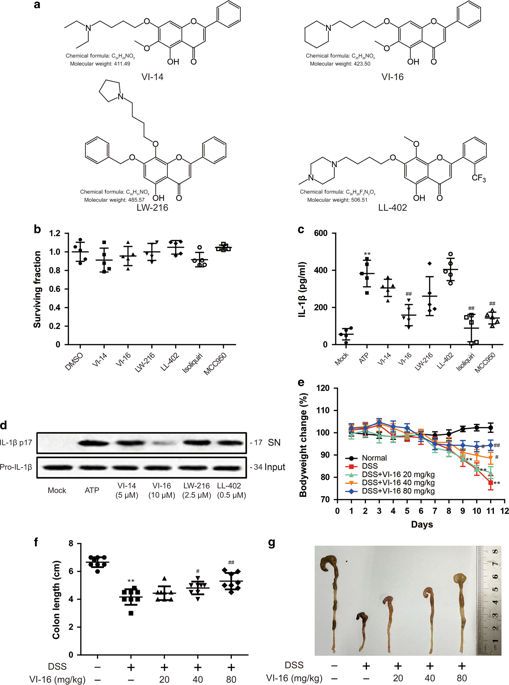当前位置:
X-MOL 学术
›
Mucosal Immunol.
›
论文详情
Our official English website, www.x-mol.net, welcomes your feedback! (Note: you will need to create a separate account there.)
Flavonoid VI-16 protects against DSS-induced colitis by inhibiting Txnip-dependent NLRP3 inflammasome activation in macrophages via reducing oxidative stress.
Mucosal Immunology ( IF 8 ) Pub Date : 2019-05-31 , DOI: 10.1038/s41385-019-0177-x Yue Zhao 1 , Qinglong Guo 1 , Qin Zhu 1 , Renxiang Tan 2 , Dongsheng Bai 1 , Xiumin Bu 1 , Binyan Lin 1 , Kai Zhao 1 , Chuyue Pan 1 , Haiyan Chen 3 , Na Lu 1
Mucosal Immunology ( IF 8 ) Pub Date : 2019-05-31 , DOI: 10.1038/s41385-019-0177-x Yue Zhao 1 , Qinglong Guo 1 , Qin Zhu 1 , Renxiang Tan 2 , Dongsheng Bai 1 , Xiumin Bu 1 , Binyan Lin 1 , Kai Zhao 1 , Chuyue Pan 1 , Haiyan Chen 3 , Na Lu 1
Affiliation

|
Emerging evidence suggests that NLRP3 inflammasome was associated with various kinds of immunological diseases including colitis. However, there are few drugs targeting inflammasomes in the treatment of colitis. Several flavonoids have been found to affect the inflammasome pathway, but the mechanism is still confusing. Here we report that VI-16, a synthetic flavonoid compound, exerts potent anti-inflammatory effects on macrophages in DSS-induced colitis mice, which intervened in the activation of NLRP3 inflammasome without affecting intestinal epithelial cells. However, the protection of VI-16 against DSS-induced colitis was dependent on NLRP3 expression in hematopoietic cells. Furthermore, this inhibitory effect of VI-16 was found to be at least partially achieved by decreasing the mitochondrial ROS generation without affecting autophagy. Further studies confirm that VI-16 inhibits the binding of Txnip to NLRP3 by reducing oxidative stress and ultimately inhibits NLRP3 inflammasome. This demonstrates the ability of VI-16 to inhibit the NLRP3 inflammasome activation and its potential use in the treatment of inflammatory bowel disease.
中文翻译:

类黄酮 VI-16 通过减少氧化应激抑制巨噬细胞中依赖于 Txnip 的 NLRP3 炎性体激活,从而预防 DSS 诱导的结肠炎。
新出现的证据表明,NLRP3 炎症小体与包括结肠炎在内的多种免疫疾病有关。然而,在结肠炎的治疗中,很少有靶向炎性体的药物。已发现几种类黄酮影响炎性体通路,但其机制仍令人困惑。在这里,我们报告了 VI-16 是一种合成类黄酮化合物,它对 DSS 诱导的结肠炎小鼠的巨噬细胞具有强大的抗炎作用,它可以在不影响肠上皮细胞的情况下干预 NLRP3 炎性体的激活。然而,VI-16 对 DSS 诱导的结肠炎的保护作用取决于造血细胞中 NLRP3 的表达。此外,发现 VI-16 的这种抑制作用至少部分是通过减少线粒体 ROS 的产生而不影响自噬来实现的。进一步的研究证实,VI-16 通过减少氧化应激来抑制 Txnip 与 NLRP3 的结合,最终抑制 NLRP3 炎性体。这证明了 VI-16 抑制 NLRP3 炎性体激活的能力及其在治疗炎症性肠病中的潜在用途。
更新日期:2019-11-18
中文翻译:

类黄酮 VI-16 通过减少氧化应激抑制巨噬细胞中依赖于 Txnip 的 NLRP3 炎性体激活,从而预防 DSS 诱导的结肠炎。
新出现的证据表明,NLRP3 炎症小体与包括结肠炎在内的多种免疫疾病有关。然而,在结肠炎的治疗中,很少有靶向炎性体的药物。已发现几种类黄酮影响炎性体通路,但其机制仍令人困惑。在这里,我们报告了 VI-16 是一种合成类黄酮化合物,它对 DSS 诱导的结肠炎小鼠的巨噬细胞具有强大的抗炎作用,它可以在不影响肠上皮细胞的情况下干预 NLRP3 炎性体的激活。然而,VI-16 对 DSS 诱导的结肠炎的保护作用取决于造血细胞中 NLRP3 的表达。此外,发现 VI-16 的这种抑制作用至少部分是通过减少线粒体 ROS 的产生而不影响自噬来实现的。进一步的研究证实,VI-16 通过减少氧化应激来抑制 Txnip 与 NLRP3 的结合,最终抑制 NLRP3 炎性体。这证明了 VI-16 抑制 NLRP3 炎性体激活的能力及其在治疗炎症性肠病中的潜在用途。


























 京公网安备 11010802027423号
京公网安备 11010802027423号